Hi, you fine folks out there in the Otakusphere and beyond. It’s time once again for me to take another pick from the anime that people have submitted to me and give something else a shot as I go In Search Of… my next favorite anime.
Yes. All of that was a lead-in so I could introduce the title of this segment. I’m actually using the name of my blog how I originally intended. Way back when it was supposed to be a search of my ninth favorite anime of all time. The problem is that once I find my ninth favorite anime, well, the blog is over.
But I liked the blog title so much, I couldn’t really ditch it either. So, since I’m also unwilling to let go of a good thing, I’m repurposing it for this segment where people in the community submit an anime to me that I haven’t watched (or forgot to put on my MAL), and I watch it.
Remember, if you want me to watch a show and tell you what I think, you can submit it here. Please remember to tell me your name. I mean not your real name, your internet name.
But let’s get to business because this week, we’re going In Search of … The Great Passage.
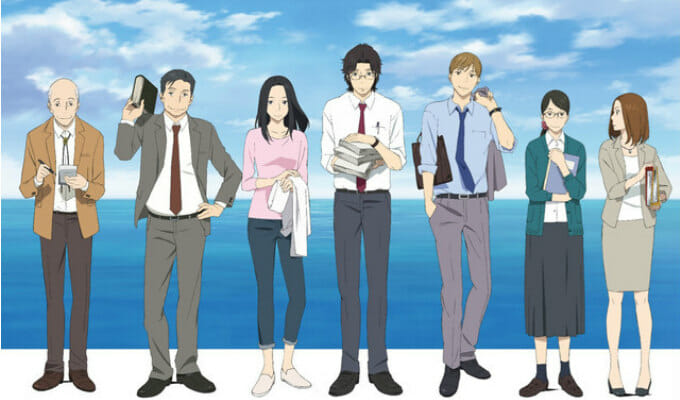
This recommendation came to me by way of Jon Spencer of Jon Spencer Reviews. He is a man who needs no introduction. Jon has a finger in so many pies that I think they’ve run out of pies. He is the creator of Jon’s Creator Showcase, the titular head of the Jon Spencer Collective and organizes #Anitwitwatches. Oh yeah, and he has a blog too.
The Great Passage is an 11-episode anime series that ran from October to December 2016. It was produced by Zexcs, directed by Toshimasa Kuroyanagi, with series composition done by Takuya Satō. The whole thing is based on an award-winning novel by Shion Miura.
I think most of the descriptions of this show are full of lies. Here is the most accurate description I can come up with. The Great Passage tells the story of creating a new medium-sized Japanese dictionary and the five people instrumental to that creation.
So it sounds about as dry as dirt, so why does Jon think this is the show for me?
“I think you will like it for the directing and subject matter. It’s also nice and short at 11 episodes.”
So why does he like it?
“Shows about communication, life, and stuff like that I greatly enjoy.”
OK. Not much to go on, but let’s find out as we board our ship and sail it across the sea of words to our hopeful Ferris wheel off in the distance.
The Story of Daitokai
After watching all of this show and reading the novel it was based on, I have a lot of feelings and thoughts. But I’m going to start here. At its heart, The Great Passage is about communication. It’s about how we talk to friends, coworkers and lovers. It’s about how we communicate with them when we’re not talking. It’s about the things we say and the things we don’t say.
We start the show with a conversation between longtime dictionary editor Kohei Araki and his collaborator Professor Matsumoto. They are still in the planning process of a wholly original dictionary that will be a new dictionary for a new century.
(OK. They don’t say those words exactly, but they come close.)
The only problem is that Araki’s wife is sick, so he can’t keep working full-time on the dictionary because he needs to take care of her. (In the book, they add that he is being forced to retire because of his age.)
But Araki is not to be deterred. He will find a replacement. Enter Mitsuya Majime. A poor performing salesman for the Genbu book publishers who has spent his life with books. In fact, his library has grown until it has taken over the entire bottom floor of the house.
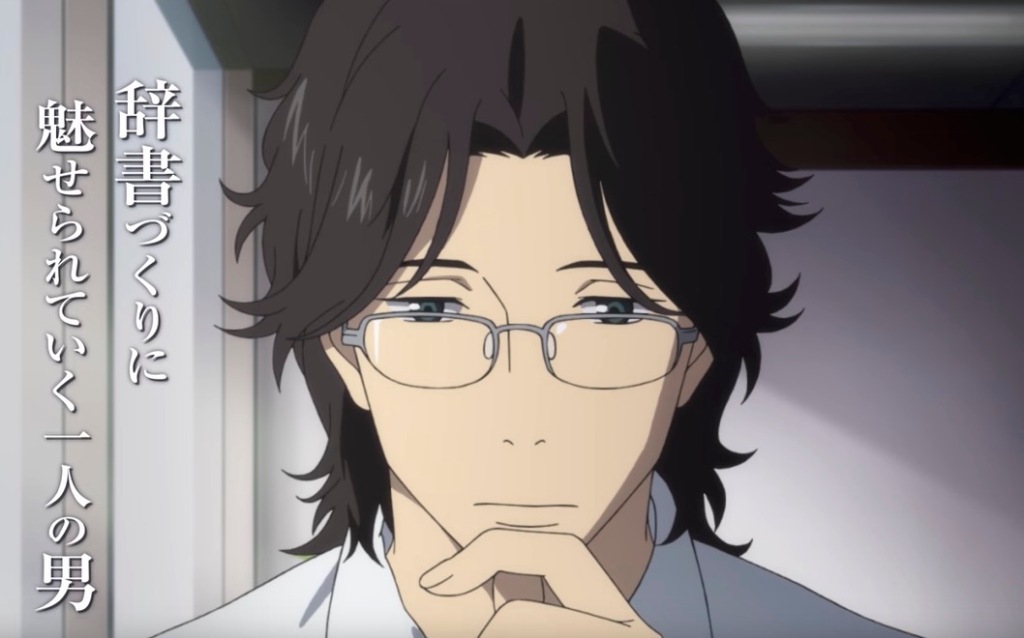
One day, while Majime is on a sales run, he crosses paths with Masashi Nishioka, a somewhat callow young fellow stuck working in Genbu’s dictionary department. Well, he gives Majime a dressing down, and during that conversation, Majime goes into a reverie about a turn of phrase.
When Nishioka shares that information with Araki, the editor knows that he’s found his man. So he tracks down and recruits Majime.
OK. So let’s stop here for a second. If you thought this would be some sort of sports movie tale where the newcomer has to learn how to fit in and eventually lead his team to victory by overcoming his personal demons, you would be a lot like me.
That is because that is what the back of the box tells you this story will be. While they are not entirely wrong, it’s not the best way to think of The Great Passage. Instead, imagine a line. At the start of the line, we have the conversation between Araki and Matsumoto, and at the end of the line, we have the finished dictionary 15 years later.
Now along that line, we have small arcs. Majime meets and falls in love with his landlord’s daughter. Nishioka finds that it’s essential to be passionate and serious about something. Then there is another arc about a character that comes in after a time jump, and finally, we return to Majime for one final arc.
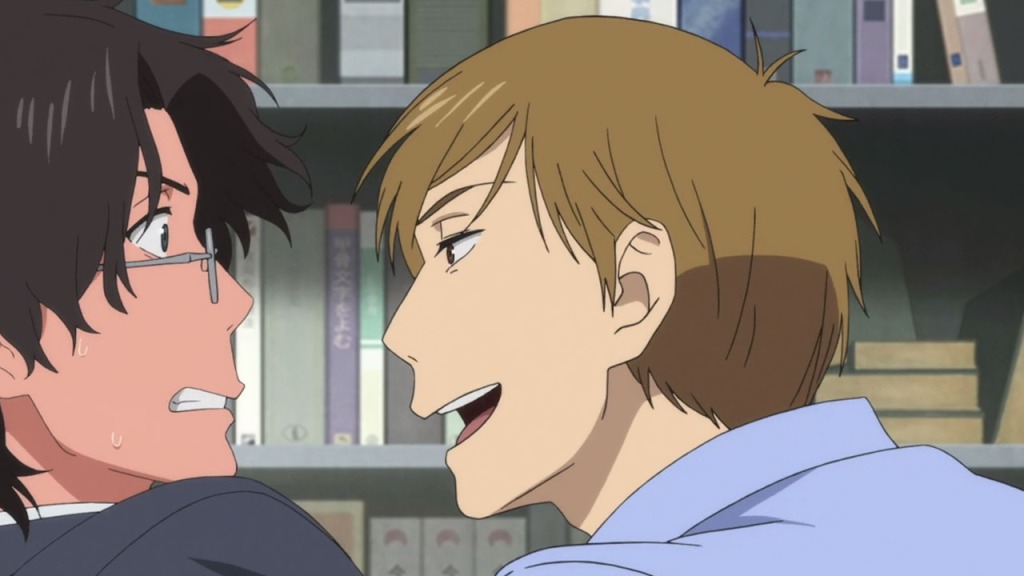
At its heart, it’s better to think of The Great Passage as something closer to Mr. Holland’s Opus. The primary element that is moving through time is Mr. Holland’s career, but in the end, what we’re seeing are the small stories of students interacting with Mr. Holland.
The Great Passage is a collection of vignettes or short stories collected around this central core of the creation of the dictionary.
In many ways, this makes The Great Passage a much smaller story than you might imagine. There are a few moments of high drama, but we don’t get any pitched battles between Majime and Nishioka. We don’t have a cruel publishing company try to crush Majime’s spirit (although we do get hints of it.)
What drama we get has small stakes. Will Majime’s love interest understand the letter he is giving her? Will Nishioka kneel in front of a professor who loves his own words too much? Will Kishibe manage to find her place in the dictionary editorial department? Will the dictionary finish on time?
Long sections of this show are filled with quiet conversations about words, their meanings, and dictionaries’ creation in general. In many ways, it’s a slice-of-life show that traded in tea parties and parfaits for definitions and galley proofs.
A Ship of Metaphor
I will be honest. All of this could make for a really boring show. There are almost no stakes. There is little in the way of dramatic climaxes. This would be true, except for three things.
The first is pretty obvious, but the show never really promises high drama. Instead, right from the first episode, we get a show that proceeds at a meditative pace. I won’t say it’s slow, but it is deliberate. For the most part, though, a combination of well-shot conversations, internal monologues and (mostly) good use of music keeps things moving when they need to. So it never feels slow.
The second reason is that all of these characters are likable. This is one of the best improvements from the book to the show. I would like to meet any of these people in a bar and strike up a conversation.
One of the problems that often crop up when all of the characters are likable is that the conversations become bland, but these never do. This is because all of the characters are unique enough to have jovial tension between them.
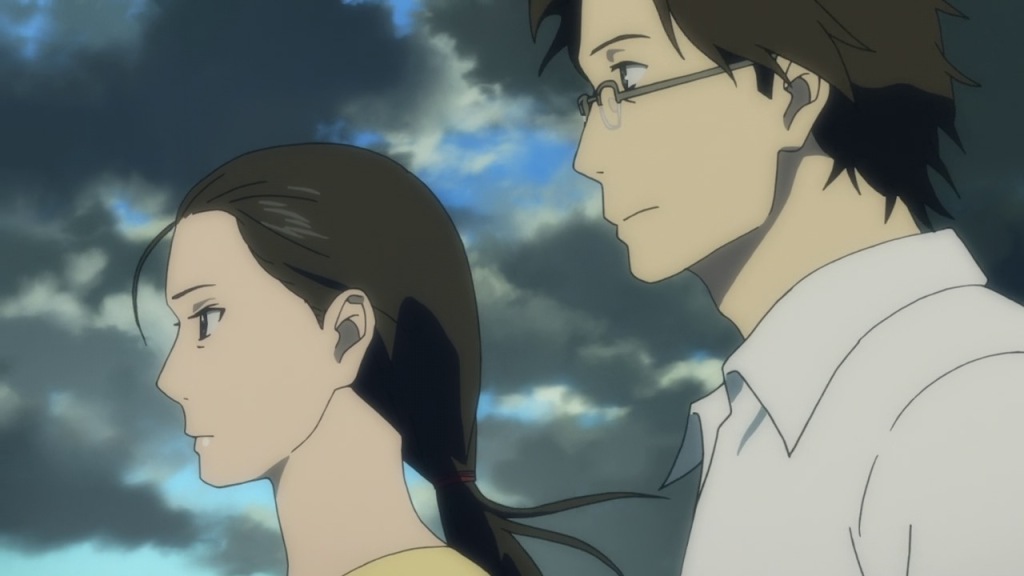
Nishioka gives Majime a certain amount of good-natured ribbing about his clumsy and obscure love letter, but it’s never mean. Majime has random moments where he gets lost in thought, but it never makes him annoying.
I wish every anime director and writer could figure out the trick of making an entire cast of characters enjoyable. Do this more anime! Please.
The third reason that makes this show so enjoyable is thinking about what it’s trying to say about words, communication and taking life seriously. This is a show for people who want to parse out its meanings. There are so many different things to think about.
For instance, each episode has a one-word title, and that one word resonates throughout the episode. An example of this can be seen in the first episode, called “Vastness” In it, we are told a dictionary is meant to help people cross the ocean of words.
We are continually shown images of Majime stuck in the middle of an ocean of words as he imagines himself drowning in it. While these ideas are not hard to parse, we are given even more symbols that required me to think harder about the show.
In those same pictures of the ocean of words, we see a Ferris Wheel off in the distance. It appears to be an aspirational point for Majime. It represents a calm, predictable place for him.
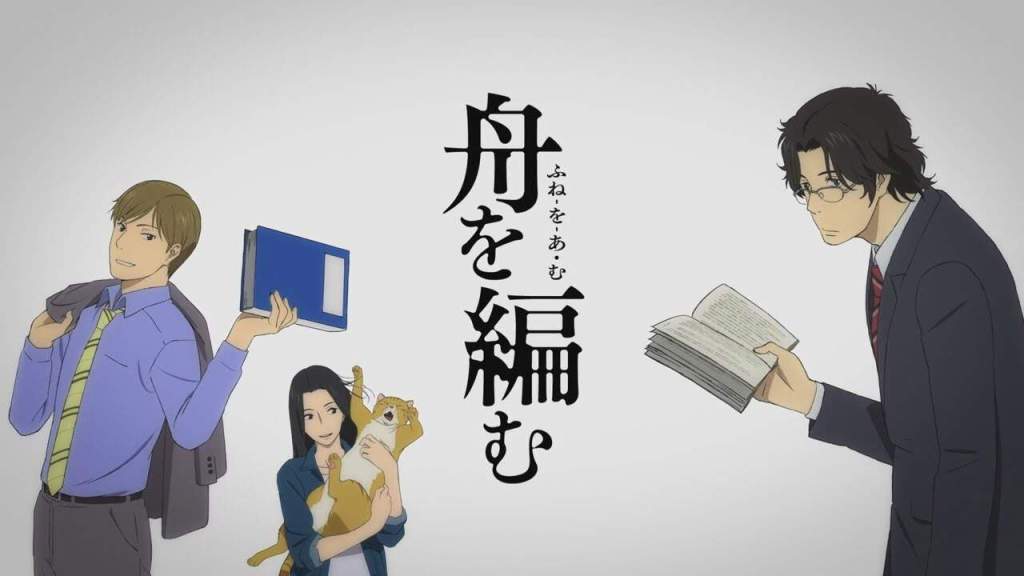
While I don’t think the Great Passage gives us any clear “answers,” it does show the good and bad sides of Majime’s seriousness or Nishioka’s fecklessness. It explores how we use words, but also how we use clothes or gestures. It talks about how words change over time and urges us not to get too locked into meanings.
This is what makes The Great Passage more than just a collection of conversations that take place around dictionary cards and whiteboards. Instead, these conversations have real meanings and perceived implications.
Now I do have to give one caution. Some shows can ask the audience to look deeper but don’t require them to. I think a large part of the enjoyment of The Great Passage comes from trying to tease out what the show is trying to say. If you’re not interested in trying to beat the meaning out of each episode title or find the other meanings for the conversations that occur, this is not the show for you.
This is not a show meant for casual viewing. Or at least I don’t think so.
Leaks in the ship
We need to talk about the music in this show.
Good lord. Do we need to talk about the music. So this show leans heavily on it to generate drama and tension. And for maybe more than half of the time, it works. Sometimes, it works well.
The problem is the other half of the time. Music is often a hard thing to get right in film. When it’s done well, the audience really shouldn’t notice. It should become part of a seamless whole. But when it doesn’t work well, it becomes an anchor that drags the whole project down with it.
On more than one occasion, either the wrong music was picked, or the music that was selected was so heavy-handed that it ruined the effect it was trying to achieve.
This probably wouldn’t have been nearly as bad if there wasn’t so much music in the show. There is one episode where we have a montage of people working, and then we have a momentary break and then dive right back into another montage. It was starting to get a bit monotonous.
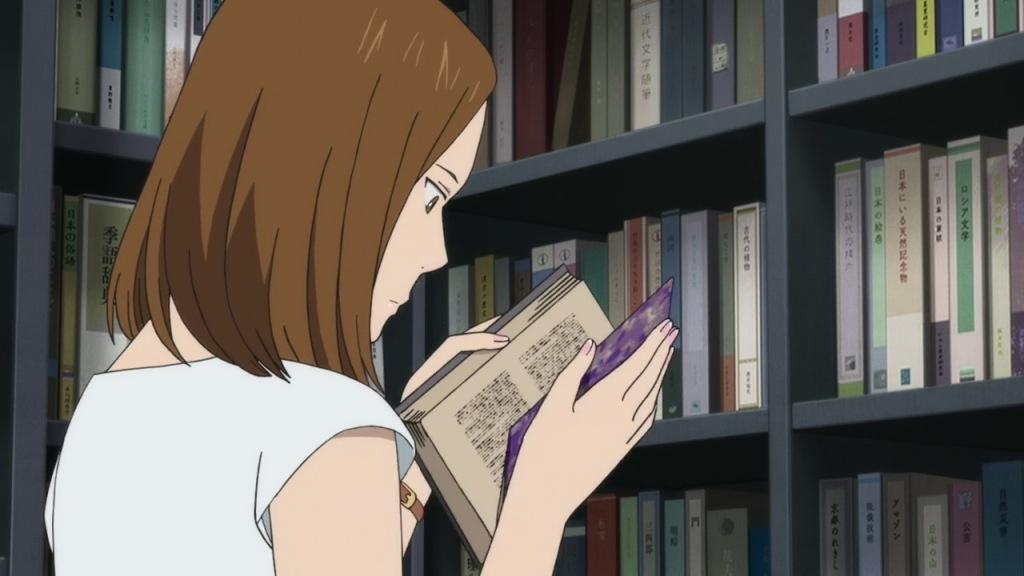
My other problem with the show is relatively small. To make the show more interesting, the writers did something clever when they adapted it from the book. They expanded Nishioka’s character and his relationship with Majime to make it more interesting. And they succeeded. The relationship between the two characters is the most interesting one in the show.
The problem is that in Episode 8, we jump ahead about 10 years and are introduced to an entirely new character, Midori Kishibe. In the book, it’s pretty clear that it’s coming, but in the show, it completely blindsided me.
While the show did a good job with translating Kishibe to the screen and gave her a more significant role, it was never as interesting of a relationship as the one with Nishioka.
These complaints are relatively small, though. While they may keep The Great Passage from being a masterpiece, they don’t stop it from being a darn good show.
Across the Sea of Words
So I could spend another half dozen posts exploring all of the exciting things this show does and all of the symbolism it uses, and whether it works well or is too on the nose. I could share theories about what the show is saying about how people communicate and what the various symbols mean.
But I’ll have to save that for whenever I revisit this show.
What I’ll leave on is a thought that Professor Matsumoto shared. He tells us that Japan never had a state-funded dictionary, unlike other countries. He said this has allowed the language to stay free from intervention other than from the editors who pick the words and put them into the dictionary. He tells Araki and Majime:
“Words and the hearts of those who use them must remain free.”
It’s an interesting thought to finish out on. So until I come back to watch this show again, I’ll just let every one ponder that.
For now, dear readers, this is iniksbane, writing from a leaky life raft in the middle of an ocean of words. Over and out.
As always, thanks for reading.
And please, if you think there is a show that I should watch that I don’t have marked on my My Anime List, please please fill out this form and tell me about it. Please remember to leave your name in the first answer box, so I know who sent it.
Please. Pretty please.
I love this series. I plan to read the novel eventually.
It’s worth it. They aren’t that different, but there are a few differences.
Enjoyed your review and I’m glad you liked the show. Hopefully you can see went I didn’t say too much in my form, I thought this would be better if you knew less about it.
I definitely understand. It’s a good show.
I wonder have you watched Anohana anime?!
I haven’t. I have it on a watchlist somewhere.
Well do checkout.. its bit on emotional side but you’ll love it for sure…
This was actually a live action film three years before it was an anime and it was pretty great too:
🙂
That is interesting. I wonder how the story translates to film. I’ll have to hunt it down.
Loved this too, agree about Midori – might not have taken much screen-time at all to foreshadow her a bit more.
Still, I loved the focus on words, just a whole anime about words – seems so, so very rare.